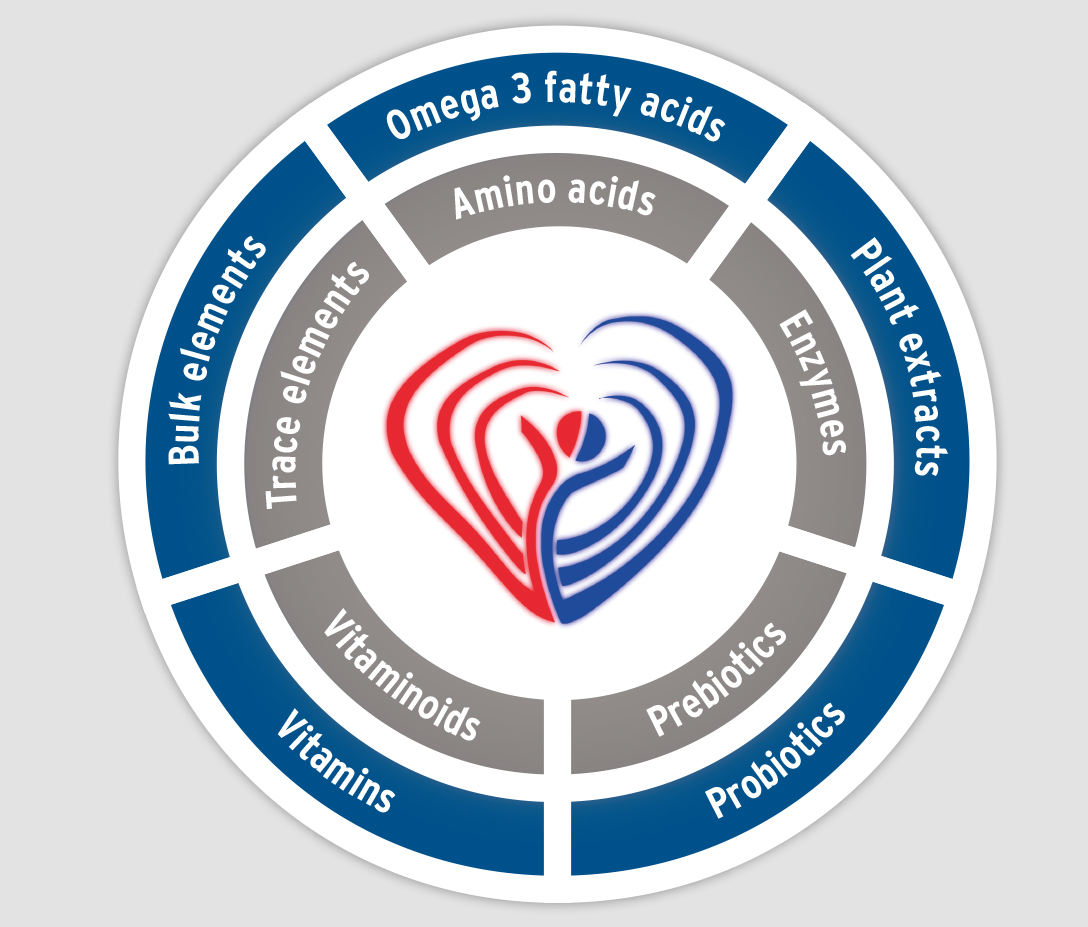Nutritional medicine is a multidisciplinary area of medicine, which deals with the influence of nutritional factors on the state of the body and sees nutrition as a key modulator of the state of health.
Nutritional factors modulate the organ and body functions of humans in diverse ways as an important component of the exposome, understood as all exogene (coming from outside) and non-genetic endogene (coming from inside) influencing factors to which a person is subject throughout their life.
The orthomolecular active substances in particular are accorded an important regulatory function. As well as vitamins, minerals, trace elements, amino acids, long-chain omega 3 fatty acids, this group of substances also includes bacterial cultures, enzymes, botanical and the secondary plant substances.
Wellbeing, quality of life and health of humans is thus significantly determined by the type of diet. The founder of modern occidental medicine , the Greek doctor Hippokrates of Kos (460-375 before Christ) already postulated this:
"Live a healthy life, and you will rarely become ill, except from an accident or epidemic. If you become ill, the right diet will grant you the best possibility to become well again."
Current scientific studies are actually impressively proving this: Diet is an important pillar of health care and an important influencing risk factor for many chronic diseases. Dietary guidance therefore quite rightly counts as “the most effective and cost-efficient form of disease prevention“. Health economic calculations for the German health system thus yielded a saving potential of up to 37.5 billion euros per year with a sufficient supply of vitamin D alone. To supply the population of Europe with an adequate amount of the long-chain omega 3 fatty acids EPA and DHA (1000 mg/day), the cost savings for cardiovascular-related diseases amounts to around 12.9 billion euros over the coming five years. These figures are already illustrating the significance of nutritional medicine for the health system.
Orthomolecular active substances as a key component of exposome
Nutritional medicine – individualised medicine with an interdisciplinary focus
Nutritional medicine is an interdisciplinary specialism which is based on the findings of modern biomedical sciences (nutritional and food science, physiology and biochemistry) and the clinical specialisms, in this case preventative medicine and internal medicine in particular. Its scope includes the “Influence of diet on the functional state of the healthy and unhealthy human body and the influence of diseases on nutritional requirements, intake and utilisation. The aim of nutritional medicine is to
- prevent diet-related diseases (primary prevention)
- to curb the progression or the chronification of existing diseases (secondary prevention) or to minimise the probability of relapses, consequential damage and secondary diseases (tertiary prevention) and
- to mitigate diseases and symptoms using suitable dietary treatment measures
Prevention and dietary therapy using micronutrients and other biofactors
The targeted application of defined quantities of micronutrients and other biofactors is a significant building block of modern nutritional medicine. The administration of biofactors thus serves:
- a preventative purpose, targeting an optimal physiological state of the body
- the indication-specific use in particular life phases (pregnancy and breastfeeding, competitive sports, older age) or in the context of particular lifestyles (e.g. a vegan diet) or
- the dietary treatment of diseases. This is often carried out with a (supplementary) balanced diet which takes account of particular dietary requirements of certain patient groups (“diet management”) and which provide a combination of concentrated nutrients, which are tailored to their particular dietary needs. Today's life and diet habits often lead to a lack of key substances in the body which are necessary for the homoeostasis.
Since it was founded in 1986, Intercell Pharma has been developing, producing and marketing premium quality biological preparations. The basis for our production range is formed by the results of current medical research which we consistently evaluate in cooperation with scientists and take into account in our products.




